初一下英语一般将来时
- 格式:pdf
- 大小:125.16 KB
- 文档页数:26
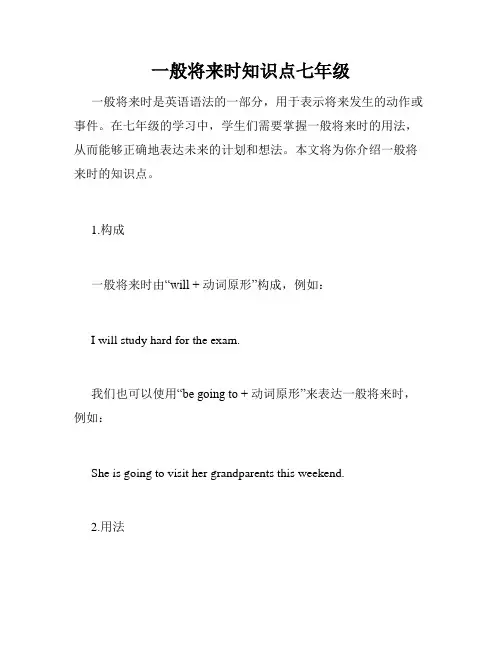
一般将来时知识点七年级一般将来时是英语语法的一部分,用于表示将来发生的动作或事件。
在七年级的学习中,学生们需要掌握一般将来时的用法,从而能够正确地表达未来的计划和想法。
本文将为你介绍一般将来时的知识点。
1.构成一般将来时由“will + 动词原形”构成,例如:I will study hard for the exam.我们也可以使用“be going to + 动词原形”来表达一般将来时,例如:She is going to visit her grandparents this weekend.2.用法(1)表示未来的计划和安排。
例如:We will have a picnic next Sunday.(2)表示预测或猜测。
例如:It will rain tomorrow.(3)表示意图、打算或决心。
例如:I will help you with your homework.(4)表示请求或提供帮助。
例如:Will you please lend me your pen?(5)表示愿望、要求或命令。
例如:I hope you will study hard.3.注意事项(1)will 通常用于第一人称和第二人称,而“be going to”通常用于第三人称。
例如:I will take the bus home.You will enjoy the party.He is going to buy a new car.(2)在口语中,我们可以缩略将来时形式。
例如:I'll call you later.We're going to the beach this weekend.(3)应该避免在句子中使用简单现在时代替将来时。
例如:Wrong: She flies to New York next week. Right: She will fly to New York next week.4.例子下面是一些使用一般将来时的例子:I will buy a new phone next month. Sandy is going to take French lessons.Will you go to the concert with me?They will have a party on Friday.I hope you will enjoy your vacation.总结在七年级的英语学习中,学生们需要掌握一般将来时的用法。

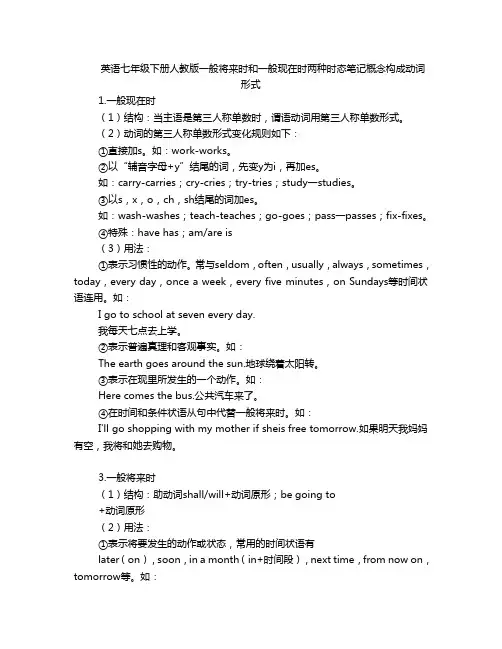
英语七年级下册人教版一般将来时和一般现在时两种时态笔记概念构成动词形式1.一般现在时(1)结构:当主语是第三人称单数时,谓语动词用第三人称单数形式。
(2)动词的第三人称单数形式变化规则如下:①直接加s。
如:work-works。
②以“辅音字母+y”结尾的词,先变y为i,再加es。
如:carry-carries;cry-cries;try-tries;study一studies。
③以s,x,o,ch,sh结尾的词加es。
如:wash-washes;teach-teaches;go-goes;pass一passes;fix-fixes。
④特殊:have has;am/are is(3)用法:①表示习惯性的动作。
常与seldom,often,usually,always,sometimes,today,every day,once a week,every five minutes,on Sundays等时间状语连用。
如:I go to school at seven every day.我每天七点去上学。
②表示普遍真理和客观事实。
如:The earth goes around the sun.地球绕着太阳转。
③表示在现里所发生的一个动作。
如:Here comes the bus.公共汽车来了。
④在时间和条件状语从句中代替一般将来时。
如:I'll go shopping with my mother if sheis free tomorrow.如果明天我妈妈有空,我将和她去购物。
3.一般将来时(1)结构:助动词shall/will+动词原形;be going to+动词原形(2)用法:①表示将要发生的动作或状态,常用的时间状语有later(on),soon,in a month(in+时间段),next time,from now on,tomorrow等。
如:I shall be eighteen years old next year.明年我就18岁了。
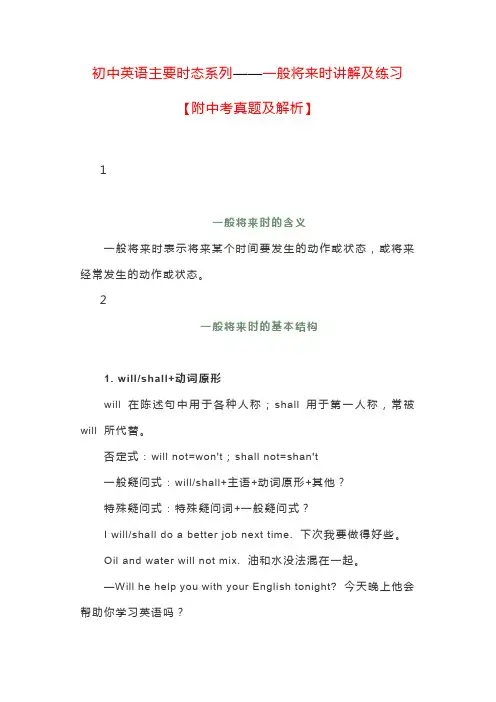
初中英语主要时态系列——一般将来时讲解及练习【附中考真题及解析】1一般将来时的含义一般将来时表示将来某个时间要发生的动作或状态,或将来经常发生的动作或状态。
2一般将来时的基本结构1. will/shall+动词原形will 在陈述句中用于各种人称;shall用于第一人称,常被will 所代替。
否定式:will not=won't;shall not=shan't一般疑问式:will/shall+主语+动词原形+其他?特殊疑问式:特殊疑问词+一般疑问式?I will/shall do a better job next time. 下次我要做得好些。
Oil and water will not mix. 油和水没法混在一起。
—Will he help you with your English tonight? 今天晚上他会帮助你学习英语吗?—Yes, he will./No, he won't. 是的,他会。
/不,他不会。
—When will you arrive for America? 你什么时候去美国?—Tomorrow. 明天。
2. am/is/are going to +动词原形否定式:am/is/are not going to +动词原形一般疑问式:am/is/are +主语+ going to + 动词原形+其他?特殊疑问式:特殊疑问词+一般疑问式?He is going to spend his holidays in London. 他打算在伦敦度假。
Look at the dark clouds. There is going to be a storm. 看那乌云,快要下雨了。
Is he going to collect any data for us? 他会帮我们收集数据吗?What are you going to do tomorrow? 明天你打算作什么?3一般将来时的用法will+动词原形与am/is/are going to +动词原形的用法虽然都表示将来发生动作或情况,一般情况下能互换。
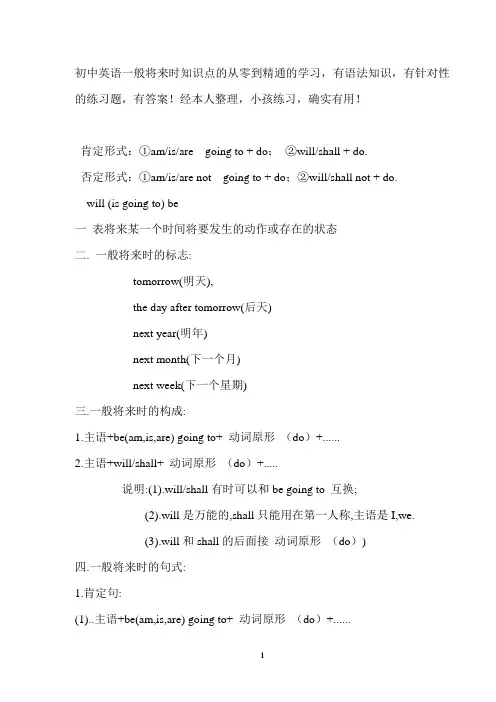
初中英语一般将来时知识点的从零到精通的学习,有语法知识,有针对性的练习题,有答案!经本人整理,小孩练习,确实有用!肯定形式:①am/is/are going to + do;②will/shall + do.否定形式:①am/is/are not going to + do;②will/shall not + do.will (is going to) be一表将来某一个时间将要发生的动作或存在的状态二. 一般将来时的标志:tomorrow(明天),the day after tomorrow(后天)next year(明年)next month(下一个月)next week(下一个星期)三.一般将来时的构成:1.主语+be(am,is,are) going to+ 动词原形(do)+......2.主语+will/shall+ 动词原形(do)+.....说明:(1).will/shall有时可以和be going to 互换;(2).will是万能的,shall只能用在第一人称,主语是I,we.(3).will和shall的后面接动词原形(do))四.一般将来时的句式:1.肯定句:(1)..主语+be(am,is,are) going to+ 动词原形(do)+......(2)..主语+will/shall+ 动词原形(do)+.....2.否定句:(1)..主语+be(am,is,are) not going to+ 动词原形(do)+......(2)..主语+will/shall not+ 动词原形(do)+.....3.一般疑问句:(1).Am/Is,Are+主语+going to+ 动词原形(do)+....(2).Will//shall+主语+ 动词原形(do)+...4.特殊疑问句:(1).What (Where, How...)+be (am,is,are)+主语+ going to + 动词原形(do)+...?(2). What (When,Where,How...) +will/shall+ 主语+ 动词原形(do)+...?二、基本结构:①be going to + do;②will+ do.三、否定句:在be动词(am, is, are)后加not或will后加not成won’t。
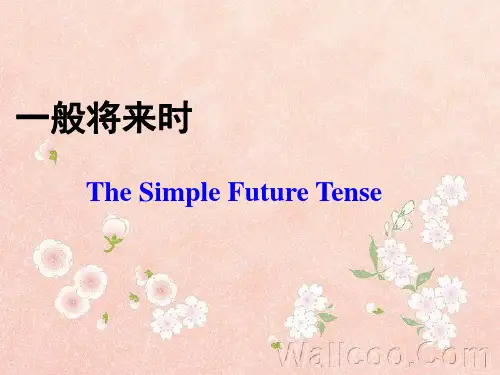
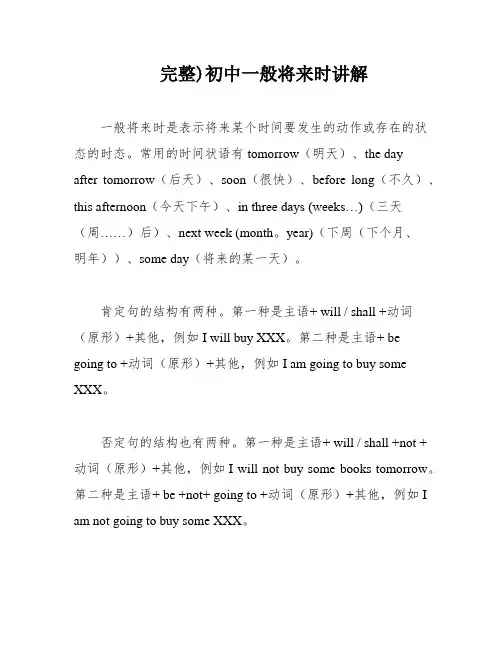
完整)初中一般将来时讲解一般将来时是表示将来某个时间要发生的动作或存在的状态的时态。
常用的时间状语有tomorrow(明天)、the dayafter tomorrow(后天)、soon(很快)、before long(不久)、this afternoon(今天下午)、in three days (weeks…)(三天(周……)后)、next week (month。
year)(下周(下个月、明年))、some day(将来的某一天)。
肯定句的结构有两种。
第一种是主语+ will / shall +动词(原形)+其他,例如I will buy XXX。
第二种是主语+ be going to +动词(原形)+其他,例如I am going to buy some XXX。
否定句的结构也有两种。
第一种是主语+ will / shall +not +动词(原形)+其他,例如I will not buy some books tomorrow。
第二种是主语+ be +not+ going to +动词(原形)+其他,例如I am not going to buy some XXX。
疑问句的结构也很简单。
第一种是Will / Shall +主语+动词原形+其他…?例如XXX?第二种是Be +主语+going to +动词原形+其他…?例如Are you going to buy some books tomorrow?肯定回答有两种方式。
第一种是Yes,主语+will,例如Yes。
I will。
第二种是Yes,主语+ be,例如Yes。
I am。
否定回答也有两种方式。
第一种是No,主语+will +not,例如No。
I will not。
第二种是No,主语+be + not,例如No。
I am not。
除了一般将来时,还有其他表示将来的时态,如be going to、be to(高中)、be about to(初中)。
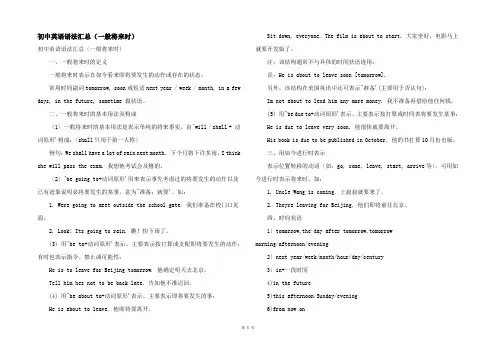
初中英语语法汇总(一般将来时)初中英语语法汇总〔一般将来时〕一、一般将来时的定义一般将来时表示在如今看来即将要发生的动作或存在的状态。
常用时间副词tomorrow, soon或短语next year / week / month, in a few days, in the future, sometime 做状语。
二、一般将来时的基本用法及构成〔1〕一般将来时的基本用法是表示单纯的将来事实,由"will / shall + 动词原形'构成:〔shall只用于第一人称〕例句:We shall have a lot of rain next month. 下个月将下许多雨。
I think she will pass the exam. 我想他考试会及格的。
〔2〕"be going to+动词原形'用来表示事先考虑过的将要发生的动作以及已有迹象说明必将要发生的某事,意为"准备;就要'。
如:1. Were going to meet outside the school gate. 我们准备在校门口见面。
2. Look! Its going to rain. 瞧!快下雨了。
(3) 用"be to+动词原形'表示。
主要表示按打算或支配即将要发生的动作;有时也表示指令、禁止或可能性:He is to leave for Beijing tomorrow. 他确定明天去北京。
Tell him hes not to be back late. 告知他不准迟回。
(4) 用"be about to+动词原形'表示。
主要表示即将要发生的事:He is about to leave. 他即将要离开。
Sit down, everyone. The film is about to start. 大家坐好,电影马上就要开发始了。
注:该结构通常不与具体的时间状语连用:误:He is about to leave soon [tomorrow].另外,该结构在美国英语中还可表示"准备'(主要用于否认句):Im not about to lend him any more money. 我不准备再借给他任何钱。
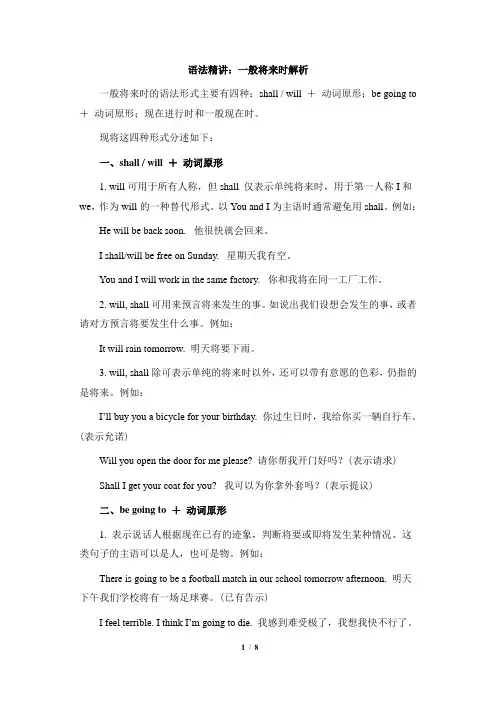
语法精讲:一般将来时解析一般将来时的语法形式主要有四种:shall / will +动词原形;be going to +动词原形;现在进行时和一般现在时。
现将这四种形式分述如下:一、shall / will +动词原形1. will可用于所有人称,但shall 仅表示单纯将来时,用于第一人称I和we,作为will的一种替代形式。
以You and I为主语时通常避免用shall。
例如:He will be back soon. 他很快就会回来。
I shall/will be free on Sunday. 星期天我有空。
You and I will work in the same factory. 你和我将在同一工厂工作。
2. will, shall可用来预言将来发生的事。
如说出我们设想会发生的事,或者请对方预言将要发生什么事。
例如:It will rain tomorrow. 明天将要下雨。
3. will, shall除可表示单纯的将来时以外,还可以带有意愿的色彩,仍指的是将来。
例如:I’ll buy you a bicycle for your birthday. 你过生日时,我给你买一辆自行车。
(表示允诺)Will you open the door for me please? 请你帮我开门好吗?(表示请求)Shall I get your coat for you? 我可以为你拿外套吗?(表示提议)二、be going to +动词原形1. 表示说话人根据现在已有的迹象,判断将要或即将发生某种情况。
这类句子的主语可以是人,也可是物。
例如:There is going to be a football match in our school tomorrow afternoon. 明天下午我们学校将有一场足球赛。
(已有告示)I feel terrible. I think I’m going to die. 我感到难受极了,我想我快不行了。
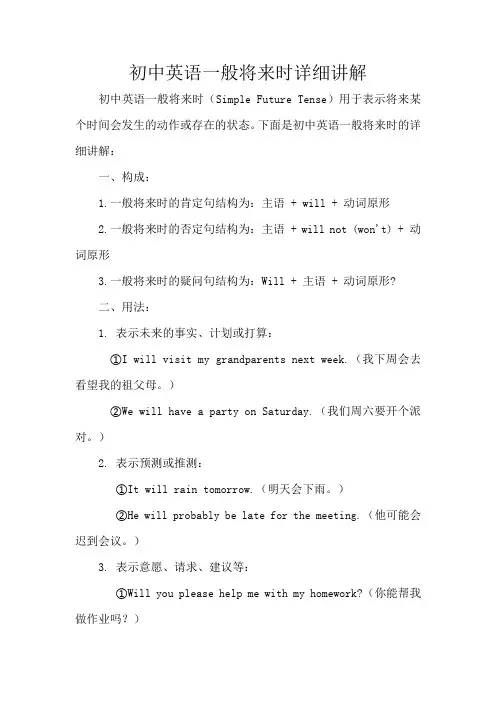
初中英语一般将来时详细讲解初中英语一般将来时(Simple Future Tense)用于表示将来某个时间会发生的动作或存在的状态。
下面是初中英语一般将来时的详细讲解:一、构成:1.一般将来时的肯定句结构为:主语 + will + 动词原形2.一般将来时的否定句结构为:主语 + will not (won't) + 动词原形3.一般将来时的疑问句结构为:Will + 主语 + 动词原形?二、用法:1. 表示未来的事实、计划或打算:①I will visit my grandparents next week.(我下周会去看望我的祖父母。
)②We will have a party on Saturday.(我们周六要开个派对。
)2. 表示预测或推测:①It will rain tomorrow.(明天会下雨。
)②He will probably be late for the meeting.(他可能会迟到会议。
)3. 表示意愿、请求、建议等:①Will you please help me with my homework?(你能帮我做作业吗?)②I will do my best to help you.(我会尽力帮助你。
)4. 表示承诺或威胁:①I will always love you.(我会永远爱你。
)②If you don't listen to me, I will tell the teacher.(如果你不听我的话,我会告诉老师。
)注意事项:1. 在一般将来时中,主语通常是第一人称(I/we)或第三人称(he/she/it/they),而第二人称(you)在肯定句和否定句中都是一样的。
2. 一般将来时的疑问句需要将助动词will放在句首。
3. 在一般将来时中,表示将来时间的副词或时间状语可以与will连用,如tomorrow, next week等。
三、总结:初中英语一般将来时用于表示未来某个时间会发生的动作或存在的状态,可以用于表达事实、计划、预测、意愿、请求等。
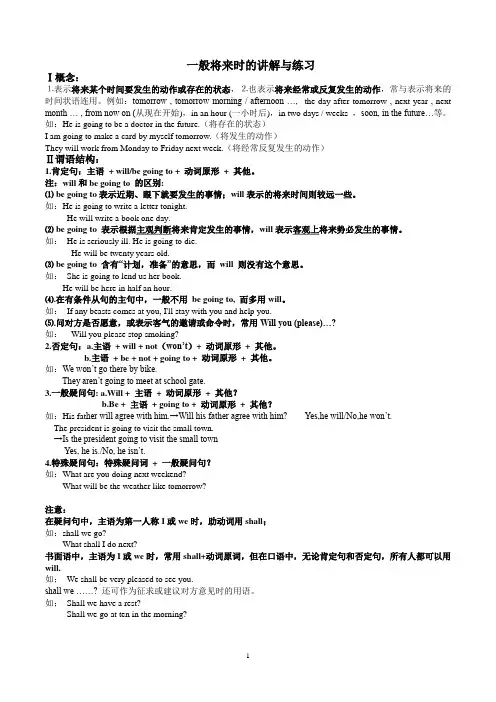
一般将来时的讲解与练习Ⅰ概念:⒈表示将来某个时间要发生的动作或存在的状态,⒉也表示将来经常或反复发生的动作,常与表示将来的时间状语连用。
例如:tomorrow , tomorrow morning / afternoon …,the day after tomorrow , next year , next month … , from now on (从现在开始),in an hour (一小时后),in two days / weeks ,soon, in the future…等。
如:He is going to be a doctor in the future.(将存在的状态)I am going to make a card by myself tomorrow.(将发生的动作)They will work from Monday to Friday next week.(将经常反复发生的动作)Ⅱ谓语结构:1.肯定句:主语+ will/be going to + 动词原形+ 其他。
注:will和be going to 的区别:⑴ be going to表示近期、眼下就要发生的事情;will表示的将来时间则较远一些。
如:He is going to write a letter tonight.He will write a book one day.⑵ be going to 表示根据主观判断将来肯定发生的事情,will表示客观上将来势必发生的事情。
如:He is seriously ill. He is going to die.He will be twenty years old.⑶ be going to 含有“计划,准备”的意思,而will 则没有这个意思。
如:She is going to lend us her book.He will be here in half an hour.⑷.在有条件从句的主句中,一般不用be going to, 而多用will。
初中英语语法——一般将来时一般将来时表示将来某个时间将要发生的动作、存在的状态或将来经常反复发生的动作其构成形式主要为“主语+am/is/are going to+动词原形”或“主语+ will / shall+动词原形”。
1.一般将来时的构成(1)be going to型eg: There is going to be a fashion show in our town tomorrow. 明天在我们县成将有一场时装秀表演。
eg: They are not going to visit the primary school next Monday. 下周一他们不去参观那所小学了。
eg: Is she going to be a teacher in the future? 将来她打算成为一名教师吗?(2)will/shall型eg: We have no more vegetables in the fridge. I will go and buy some.我们冰箱里没有蔬菜了,我将去买一些。
eg: We won't act the play. 我们将不会上演这个剧本。
eg: Will you be at home at seven this evening? 今天晚上7点你会在家吗?2.一般将来时的用法(1)be going to do结构表示打算计划要做的事或有迹象表明要发生的事。
eg: I'm going to ski tomorrow.明天我要去滑雪。
(计划、打算)eg: It' s going to be a fine day tomorrow. 明天将会是个好天气。
(迹象表明要发生)(2) will /shall do 结构will/shall do 结构表示未经过事先考虑的意图,当主语是第一人称时用shall, will 可用于各种人称。
eg: How long will the work take? 这项工作要花多长时间? (推测)eg: From now on I will shall come for the newspapers every Monday.从现在起,我每周一都来拿报纸。
第三讲:一般将来时一、定义:一般将来时表示将来某一时刻的动作或状态,或将来某一段时间内经常的动作或状态.1.表示将来某一时刻的动作或状态:e.g。
She will buy a new bike tomorrow.We will drive to the park next week.I shall visit my grandparents this weekend。
They are going to play computer games this evening.I am going to have a big meal。
2。
将来某一段时间内经常的动作或状态:e.g。
He is gong to have a big house next year .She will have a daughter.The cat will have a master。
The dog will have a house.二、常与一般将来时连用的词:1. 时间状语系列:next Tuesdaynext weeknext yearthe coming Sundaythis afternoontomorrowtonightin a few minutesin the futurein five yearsfrom now onsoon三、一般将来时的构成1. will/shall的一般将来时构成:主语 + will/shall + 动词原形+其它I will/shall go to Beijing next week.主语是第一人称时—--—— shall主语为任何人称时——--- will否定句的构成: 主语 + will/shall not + 动词原形+其它will not = won'tshall not= shan't【活学活用】按照要求改写句子1、My teacher will teach us next term。
一般将来时(The Simple Future tense)一般将来时指立足于现在,描述将要发生的事情,表示将来某一时刻的动作或状态,或将来某一段时间内经常的动作或状态。
常常和表示将来的时间状语连用。
如:tomorrow(明天),next week(下周);in the future(将来)等。
一般将来时由助动词shall(第一人称),will(第二、三人称)动词原形构成。
美式英语则不管什么人称,一律用will。
或用主语+be动词+ going to 动词。
一、构成(一)be going to 结构be going to 是一般将来时的一种固定结构,它后面要接动词原形,用来表示按计划或安排要发生的动作,有时也可以表示推测将要或肯定会发生的动作,有“准备;打算”的意思。
含有be going to 结构的句子中往往有表示将来的时间状语。
I am going to move to another school next term.下学期我要搬到另一家学校。
He is not going to come to the get-together tomorrow. 他不打算参加明天的聚会了。
——Are they going to leave for Australia next week? 他们下周打算出发到澳大利亚吗?——Yes , they are. / No , they aren’t .是的。
/不。
What are you going to do this evening ?今晚你打算干什么?(二)will 结构I will finish all the housework very soon.我很快就会完成这些家务活。
They won’t move away until tomorrow.他们明天才搬走。
——Will Mr. white give us a lecture tomorrow ?史密斯先生明天给我们作讲座吗?——Yes, he will ./ No , he won’t .是的。
初一下英语将来时在初一下学期英语课程中,学生将研究和掌握英语的将来时态。
将来时是指用来表示将来发生的动作、事件或状态的语态。
以下是一些将来时的常见用法和例句:1. 一般将来时(Simple Future Tense)一般将来时用来表示将来发生的动作或事件。
通常使用助动词"will"来构成句子。
例句:- I will go to the park tomorrow.(明天我会去公园。
)- She will study hard for the test.(她将会为考试努力研究。
)2. 现在进行时表示将来(Future Continuous Tense)现在进行时表示将来的动作或事件正在进行中。
构成方式是使用助动词"will be"加动词的现在分词形式。
例句:- I will be traveling to Beijing next week.(下周我将去北京旅行。
)- They will be having dinner at 7 p.m. tomorrow.(明天他们将在晚上七点吃晚餐。
)3. 将来完成时(Future Perfect Tense)将来完成时用来表示将来某个时间点之前已经完成的动作或事件。
构成方式是使用助动词"will have"加动词的过去分词形式。
例句:- By the end of this month, I will have finished my project.(到本月底,我将完成我的项目。
)- They will have arrived at the airport by 9 a.m. tomorrow.(明天上午九点他们将已经到达机场。
)以上是初一下学期英语将来时的主要内容。
通过学习这些将来时的用法和例句,同学们可以更好地理解和运用英语中的将来时态。
祝愿大家在学习中取得好成绩!。
初中英语一般将来时一、概念:一般将来时表示将来某个时间要发生的动作,事情或存在的状态,也表示将来经常或反复发生的动作或事情。
一般将来时常与表示将来的时间状语连用,如:tomorrow(明天),nex t week(下周),next year(明年),in the future(将来),the day after tomorrow, in 10 years(十年后)等。
二、结构:1)will/shall+动词原形shall用于第一人称,常被will 所代替。
will 在陈述句中用于各人称,在征求意见时常用于第二人称。
will not=won't shall not=shan't例如:Which paragraph shall I read first?我先读哪一段呢?Will you be at home at seven this evening? 今晚七点回家好吗?肯定句式:主语+ will + 动词(原形)+ 其它. 【主语+ will = 主语’ll】否定句式:主语+ will + not + 动词(原形)+ 其它. 【will not = won’t】一般疑问句:will + 主语+ 动词(原形)+ 其它?2)be going to +不定式,表示将来。
a. 主语的意图,即将做某事。
例如:What are you going to do tomorrow? 明天打算作什么呢?b. 计划,安排要发生的事。
例如:The play is going to be produced next month。
这出戏下月开播。
c. 有迹象要发生的事。
例如:Look at the dark clouds, there is going to be a storm. 看那乌云,快要下雨了。
肯定句式:主语+ be going to +动词(原形)+ 其它.否定句式:主语+ be + not + going to +动词(原形)+ 其它.一般疑问句:Be + 主语+ going to +动词(原形)+ 其它?3)be +不定式表将来,按计划或正式安排将发生的事。
七年级一般将来时知识点一、概念一般将来时表示将要发生的动作或存在的状态,通常由“will/shall + 动词原形”构成。
例如:We will go to the cinema tomorrow. (我们明天会去看电影。
)She shall visit her grandparents next week. (下个星期她会去探望她的祖父母。
)二、使用1. 表示将来的计划或意愿。
例如:I will study hard this year. (我今年会努力学习。
)He will go to the party tonight. (他今晚会去参加派对。
)2. 表示预测或推测未来的情况。
例如:It will rain tomorrow. (明天会下雨。
)She will be famous one day. (她总有一天会成为名人。
)3. 表示一种习惯性的行为或状态。
例如:She will often visit her aunt on weekends. (她通常会在周末去看望她的姑姑。
)He will be late for class again. (他又要迟到上课了。
)4. 表示答应或允诺。
例如:I will help you with your homework. (我会帮你做作业的。
)She will never forget your kindness. (她永远都不会忘记你的好心情。
)三、特殊情况1. 对于第一人称单数,可以使用“shall”代替“will”表达意愿或承诺。
例如:Shall I carry the bag for you? (我要不要帮你拿包?)I shall never forget your help. (我永远不会忘记你的帮助。
)2. 在某些情况下,可以使用“be going to + 动词原形”代替一般将来时。
例如:I am going to visit my grandparents this weekend. (这个周末我要去看望我的祖父母。
初一下英语一般将来时第三讲:一般将来时一、定义:一般将来时表示将来某一时刻的动作或状态,或将来某一段时间内经常的动作或状态。
1.表示将来某一时刻的动作或状态:e.g. She will buy a new bike tomorrow.We will drive to the park next week.I shall visit my grandparents this weekend.They are going to play computer games this evening.I am going to have a big meal.2.将来某一段时间内经常的动作或状态:e.g. He is gong to have a big house next year .She will have a daughter.The cat will have a master.The dog will have a house.二、常与一般将来时连用的词:1. 时间状语系列:next Tuesdaynext weeknext yearthe coming Sundaythis afternoontomorrowtonightin a few minutesin the futurein five yearsfrom now onsoon三、一般将来时的构成1. will/shall的一般将来时构成:主语 + will/shall + 动词原形+其它I will/shall go to Beijing next week.主语是第一人称时 ----- shall主语为任何人称时 ----- will否定句的构成: 主语 + will/shall not + 动词原形+其它will not = won’tshall not= shan’t【活学活用】按照要求改写句子1、My teacher will teach us next term.(改为否定句)___________________________________________2、I shall not buy new clothes this month.(改为肯定句)___________________________________________3、She is playing computer games.(改为将来时)___________________________________________4、We shan't take part in the football match.(改为肯定句)___________________________________________5、I visit my grandparents every weekend.((改为将来时)___________________________________________2. be going to的一般将来时构成:主语+ be going to + 动词原形+ 其他She is going to play basketball this afternoon.主语是”I”时 ----- am主语为单数时 ----- is主语为复数及you时 ----- are否定句的构成: 主语 + be not going to + 动词原形+ 其他She is not going to play basketball this afternoon.is not = isn’tam not = ’m notare not = aren’twill或shall与be going to区别:1. will或shall用法总结:1)表示一个将来的动作或状态,“要…,会…”She will go to the park tomorrow.2)表示不以人的意志为转移的自然发展的事。
Tom will be 18 next year.Spring will come again.Tomorrow will be Sunday.3) will+v 有时表示说话是临时决定或打算。
--- My car won’t start.---Don’t worry, I will come and give it a push.2. be going to用法总结:1)用来表示按计划或安排要发生的动作,“准备;打算”。
这种主观意图,一般已做过事先安排,故其实现的可能性较大We are going to have a class meeting this afternoon.(安排)2)表示根据现有情况、某种迹象,判断将要或即将发生的动作。
此时不含有主观意图,只是表示说话人对客观事态发展的判断或推测Look at the black clouds. It's going to rain.Look, the tree is going to fall.【活学活用】填入适当的be动词。
1.She ______( be not) going to live in Beijing next year.2.My parents _______(be not ) going to teach in this school.3. They _____(be) going to play computer games this evening.4. I ______(be) going to have a big meal.5. I______going to go there next month.6. He____going to visit his grandparents next year.7. They ______ going to find a new house to live in.8. He ______(be not) going to see the movie.9. You _____(be not) going to work on the farm this weekend.10. We ______(be not) going to have a meeting this afternoon.3. 一般疑问句含will/shall的一般疑问句Will he go there?will/shall 主语动词原形其它Yes,he will. No,she won’t.will/shall+主语+动词原形+其它?肯定回答:Yes,主语+will/shall否定回答:No,主语+will/shall+not注意:在回答时,主语要用相应的代词代替含will/shall一般疑问句的改写秘诀:一调二改三问号;一调:即把句中的will/shall调到主语前;二改:改换主语称谓,即将句中的主语I my mine we our ours等第一人称分别改为相应的第二人称you your yours等;三问号:句末的句号改为问号含be going to的一般疑问句Is he going to play basketball there?be动词主语going to 动词原形其它Yes,he is. No,she isn’t.Be动词+主语+going to+动词原形+其它?肯定回答:Yes,主语+be否定回答:No,主语+be+not注意:在回答时,主语要用相应的代词代替含be going to一般疑问句的改写秘诀:一调二改三问号;一调:即把句中的be调到主语前;二改:改换主语称谓,即将句中的主语I my mine we our ours等第一人称分别改为相应的第二人称you your yours等;三问号:句末的句号改为问号【活学活用】将下列句子改为一般疑问句并做肯定和否定回答1. I am going to have a party tomorrow.__________________________________________________________________________________2. He is going to write to his friends.__________________________________________________________________________________3. They are going to buy a new car.__________________________________________________________________________________4. I will have many presents.__________________________________________________________________________________5. They will do heavy work.__________________________________________________________________________________6. There will be a computer in it.__________________________________________________________________________________4. 特殊疑问句以疑问词开头,对句中某一成分提问的句子叫特殊疑问句。
常用的疑问词有:what who whose which when where how why等。
其语序是:疑问词+一般疑问句语序? 如:What are you going to have tomorrow?What are you going to do tonight?How will you go there?What shall we do next?特殊疑问词+will/shall+主语+动词原形+其他?eg:Where will you go?特殊疑问词+be动词+主语+going to+动词原形+其它?eg:What is your mum going to do this weekend?注意:回答特殊疑问句时,不能用yes /no,即问什么答什么,尤其是简略回答。
如:Who is going to visit us?Helen (is).Where will we go to visit?Beijiao Park.【活学活用】一、选择正确的单词填空(可以多选)(who, where, which, why, when, how )1. ______ will you do next?2. ______ will you do this job?3. ______ are you going to shop?4. ______are you going ?5. ______ will he come back?6. ______country will Tom choose?7. ______ shall Ido?8. ______ will your parents go to work tomorrow?9. ______ are you going to Beijing?10. ______ will she stay next week?二、就画线部分提问1. They will eat at 12:00.________________________________________________ _2.She is going to swim in the sea.________________________________________________ _3. She will swim in the sea.________________________________________________ _4. Daming is going to drink a Cola.________________________________________________ _5. Daming is going to drink a Cola.________________________________________________ _6.Alex is going to play basketball with me this afternoon.________________________________________________ _7.We will get up early tomorrow morning.________________________________________________ _8.There will be an English test next Thursday.________________________________________________ _9.We are going to watch the football game.________________________________________________ _10.We are going to watch the football game.________________________________________________ _5. 其它的时态代将来的的情况:A. 用现在进行时表示。